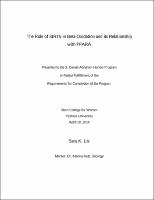Please use this identifier to cite or link to this item:
https://hdl.handle.net/20.500.12202/4211| Title: | The Role of SIRT6 in Beta Oxidation and its Relationship with PPARA |
| Authors: | Lis, Sara K. |
| Keywords: | Metabolism --Disorders --Treatment --Research. Metabolism --Regulation --Research. Sirtuins --Research. Obesity. |
| Issue Date: | Apr-2016 |
| Publisher: | Stern College for Women |
| Abstract: | The past century has seen remarkable advancements in the areas of science, health, and longevity. However, as science progresses and lifespan continues to increase, age-related metabolic diseases, such as hypertension and diabetes type 2, also continue to increase in prevalence. It is imperative upon modern society to investigate and understand metabolic pathways so that the diseases may be treated and human lifespan may continue to increase. For years, calorie restriction has been known to slow aging and increase lifespan. Previous experiments have shown that the enzyme SIRT6 increases in response to calorie restriction, indicating that the enzyme may regulate the metabolic response to calorie restriction (Gertler 2013). This study focuses on SIRT6 in order to understand its role in the metabolic pathways during caloric restriction and starvation and thus, its role in increasing longevity. During caloric restriction and starvation, glycolysis is inhibited and beta oxidation is turned on. This study seeks to investigate the role of SIRT6 in beta oxidation. PPARA, a protein that regulates beta oxidation gene expression, may be utilized to help establish the connection between SIRT6 and beta oxidation. Mice were treated with WY 14643, a PPARA agonist, to investigate SIRT6’s role in beta oxidation and its relationship with PPARA. The WY treatment activates beta oxidation and mimics starvation. The metabolites of treated wildtype mice were compared to those of treated transgenic mice that were overexpressing SIRT6. Acylcarnitine intermediates and organic acid were the two types of metabolites that were analyzed, as they both indicate beta oxidation. Results showed that levels of pyruvate, an organic acid, were higher in the transgenic mice than in the wildtype during the treatment, indicating that SIRT6 regulates 4 beta oxidation through PPARA. In addition, acylcarnitine levels of transgenic mice were lower than those of wildtype mice, while levels of two-carbon molecules were higher in transgenic mice than in wildtype mice. This data again demonstrates a SIRT6 regulatory role in beta oxidation through PPARA. The research establishes that SIRT6 plays a role in beta oxidation, specifically through regulating PPARA. SIRT6 thus holds much promise for future metabolic disease therapy developments. |
| Description: | The file is restricted for YU community access only. |
| URI: | https://hdl.handle.net/20.500.12202/4211 https://ezproxy.yu.edu/login?url=https://repository.yu.edu/handle/20.500.12202/4211 |
| Appears in Collections: | S. Daniel Abraham Honors Student Theses |
Files in This Item:
| File | Description | Size | Format | |
|---|---|---|---|---|
| Sara-Lis.pdf Restricted Access | 1.1 MB | Adobe PDF |  View/Open |
This item is licensed under a Creative Commons License

